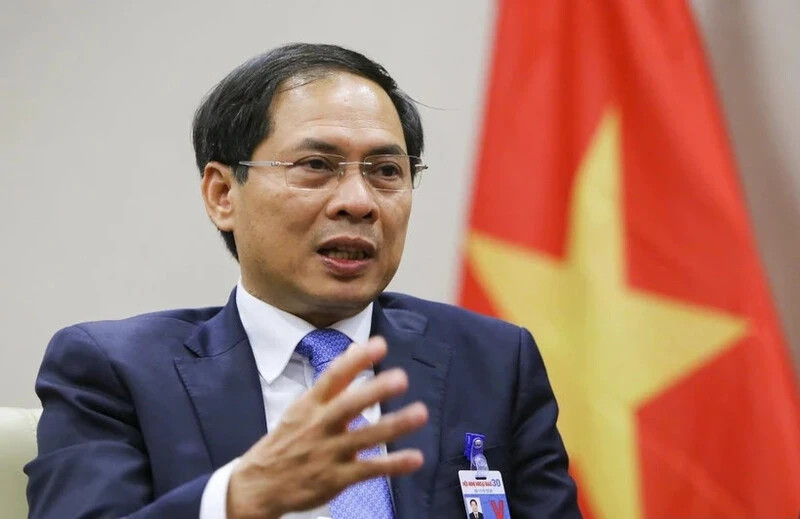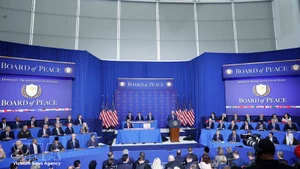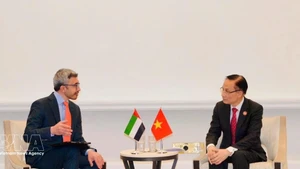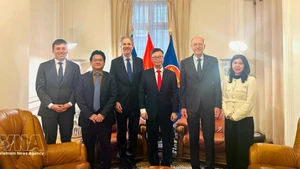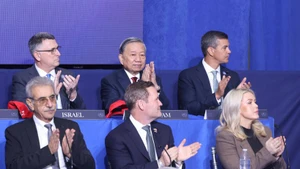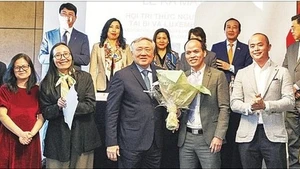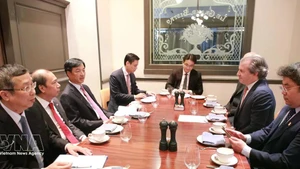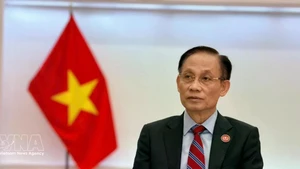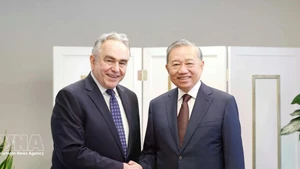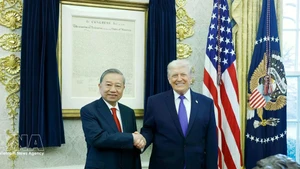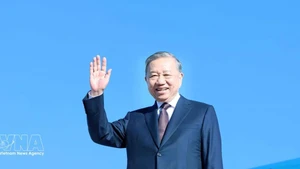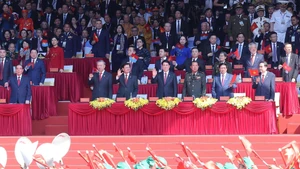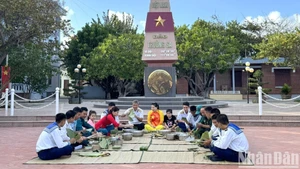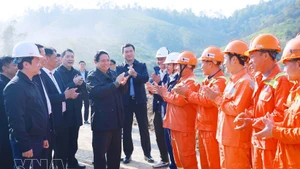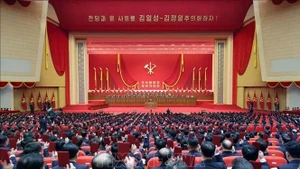Regarding the meaning of the visit, Minister of Foreign Affairs Bui Thanh Son noted that President of the Russian Federation Vladimir Putin paid a state visit to Vietnam from June 19 to 20, 2024, at the invitation of General Secretary of the Communist Party of Vietnam Nguyen Phu Trong. This was a visit with many important meanings, which can be considered a highlight of Vietnam's foreign affairs in 2024, shown in the following main points:
First of all, the visit affirmed Vietnam’s consistent foreign policy of independence, self-reliance, multilateralisation, and diversification of foreign relations for peace, friendship, cooperation and development; active, comprehensive and deep integration into the international community; and being a friend, a reliable partner and a responsible member of the international community. By welcoming President Putin, Vietnam affirmed that it always considers Russia as one of its most important partners, wishing to strengthen the time-honoured friendship with Russia and deepen the Comprehensive Strategic Partnership.
The State visit to Vietnam by President of the Russian Federation Vladimir Putin is a visit with many important meanings, which can be considered a highlight of Vietnam’s foreign affairs in 2024.
Secondly, the visit took place in the context of the two countries celebrating the 30th anniversary of the Treaty on Principles of Friendly Relations (June 16, 1994-2024) and the upcoming 75th anniversary of bilateral diplomatic relations (January 30, 1950-2025), providing an opportunity for the two sides to evaluate the results achieved and set out directions to bring cooperation and Vietnam-Russia partnership in the coming time will develop in a more comprehensive, effective, and substantial manner.
The State visit to Vietnam by President of the Russian Federation Vladimir Putin is a visit with many important meanings, which can be considered a highlight of Vietnam's foreign affairs in 2024.
Thirdly, the visit highlighted the importance given to Vietnam in implementing Russia's Look East foreign policy. In more than two decades of leading the Russian Federation, this marks the fifth time President Vladimir Putin has visited Vietnam. It is also one of his first foreign trips after being re-elected as President for a fifth term in March 2024. President Vladimir Putin's trips left a bold impression and contributed to creating important foundations for the development of Vietnam-Russian relations, including initiating and supporting the establishment of important foundations for the development of such relations, the establishment of a strategic partnership between Vietnam and the Russian Federation in 2001 and its upgrade to a comprehensive strategic partnership in 2012.
The two sides issued a joint statement between the Socialist Republic of Vietnam and the Russian Federation on deepening the Comprehensive Strategic Partnership on the basis of 30 years of achievements in implementing the Treaty on Principles of Friendly Relations, demonstrating the determination of the leaders and people of the two countries towards more effective and substantive bilateral cooperation across all fields, worthy of a global strategic partnership and meeting the needs and interests of both peoples while contributing to peace, cooperation, and development in the region and the world.
Regarding the outstanding results the two sides have achieved during the visit, Foreign Minister Bui Thanh Son affirmed that President Vladimir Putin's visit has created new momentum for multifaceted cooperation between Vietnam and Russia. Through the joint statement, 11 signed cooperation documents, and meetings and exchanges between senior leaders of the two countries, the two sides have agreed on major directions to deepen the Vietnam - Russia comprehensive strategic partnership in the following aspects:
Firstly, increasing dialogue and contact at high levels and at all levels and across all channels; effectively deploying cooperation mechanisms to promote cooperation in all fields; and continuing to coordinate closely at multilateral forums, especially the United Nations, APEC, ASEAN-Russia cooperation mechanisms, etc. Russia affirmed its support for Vietnam to host APEC Year 2027 and is ready to coordinate with Vietnam towards the successful organisation of this important event, as well as its continued support for ASEAN's central role in the regional structure.
With the tradition of remembering the source when drinking water, the Vietnamese people never forget the great and enthusiastic support and assistance that the Russian people gave to Vietnam in the fight for national independence and national unification in the past, as well as in the cause of building and protecting the Fatherland today.
Secondly, affirming that economic cooperation continues to be the pillar and focus of multifaceted cooperation between the two countries. The two sides will work together to overcome difficulties and agree on solutions to improve cooperation efficiency; improve the operational efficiency of bilateral cooperation mechanisms, especially the Intergovernmental Committee on Economic-Trade and Scientific-Technical Cooperation; and soon agree on and implement the Master Plan for developing Vietnam-Russia cooperation until 2030. The two sides will also coordinate to maximise the advantages of the free trade agreement between Vietnam and the Eurasia Economic Union (EAEU), continue to remove trade barriers, further facilitate bilateral trade, expand access to the Russian market for Vietnam's export of consumer goods and agricultural and aquatic products, and promote investment cooperation, especially in infrastructure and energy.
Thirdly, expanding defence-security cooperation to respond to non-traditional security challenges and coordinate closely at multilateral defence-security forums, especially mechanisms led by ASEAN such as the ASEAN Regional Forum (ARF), East Asia Summit (EAS), and ASEAN Defence Ministers Meeting Plus (ADMM+), thus contributing to peace, stability, security, and safety in the region Asia-Pacific and the world.
Fourthly, promoting cooperation in the fields of education-training, science-technology, tourism, labour, culture, arts, sports, local cooperation, people-to-people exchange, and education young generation to strengthen the solid humanistic foundation for the comprehensive strategic partnership. During the visit, the two sides signed 11 cooperation documents between ministries, branches, and businesses of the two countries, creating motivation to promote bilateral relations. The two sides agreed to continue creating favourable conditions for Vietnamese citizens in Russia and Russian citizens in Vietnam to live, study, and work stably while serving as a bridge of friendship between the two countries.
Fifthly, senior leaders of both sides discussed frankly and trustingly on international and regional issues of mutual concern. Accordingly, both sides affirmed their support for a fair international relations system based on international law and the United Nations Charter, especially regarding the peaceful resolution of disputes, without the threat or use of force, and non-interference in each other's internal affairs. Regarding the East Sea/South China issue, both sides support ensuring security, safety, and freedom of navigation and aviation; non-use of force nor threats to use force, peacefully resolving disputes in accordance with the principles of the United Nations Charter and international law, especially the United Nations Convention on the Law of the Sea (UNCLOS) in 1982; and support the full and effective implementation of the Declaration on the Conduct of Parties in the East Sea (DOC) and soon achieve the Code of Conduct in the East Sea (COC).
President Vladimir Putin’s state visit to Vietnam was crowned a success. Vietnam gave President Vladimir Putin and the high-ranking Russian delegation a very respectful, cordial, and thoughtful welcome. The Vietnamese people, especially those who have studied and worked in the former Soviet Union and in the Russian Federation today, always hold and cherish good feelings for the country and people of Russia. With the tradition of remembering the source when drinking water, the Vietnamese people never forget the great and enthusiastic support and assistance that the Russian people gave to Vietnam in the fight for national independence and national unification in the past, as well as in the cause of building and protecting the Fatherland today.
The two sides cherish the time-honoured and friendly relationship that has been founded and nurtured by many generations of leaders and people of the two countries, which has become a valuable common asset between the two peoples and a foundation for bilateral relations. The comprehensive strategic partnership between Vietnam and the Russian Federation continues to develop for the benefit of both countries and contributes to peace, cooperation, and development in the region and the world. This sentiment, the positive achievements in implementing the 1994 Treaty on the basic principles of Vietnam-Russia friendship, and the important results achieved during the visit will form an important basis for the two countries to inherit, promote, continue to develop, and elevate the time-honoured friendship and comprehensive strategic partnership between Vietnam and the Russian Federation.
